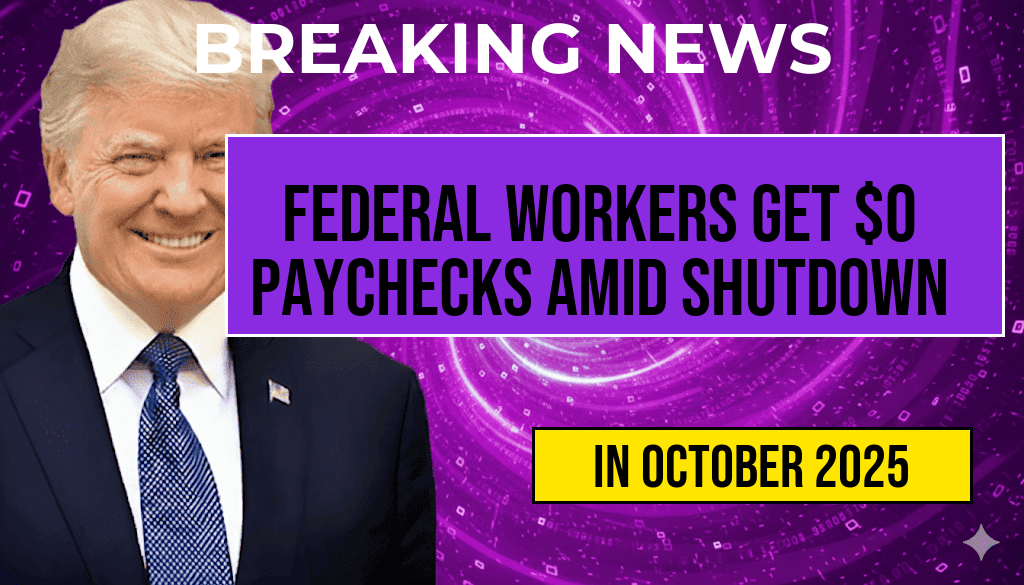As the government shutdown extends into its sixth day, federal workers are grappling with the financial strain of receiving $0 paychecks, leaving many worried about making ends meet. The shutdown, which began on October 1, has prompted concerns not only for the employees directly affected but also for millions of families relying on government assistance programs. Among the most impacted is the Special Supplemental Nutrition Program for Women, Infants, and Children (WIC), which is facing a potential funding crisis as its $8 billion lifeline begins to dwindle. With both federal employees and vulnerable populations in jeopardy, the ramifications of the shutdown are becoming increasingly severe.
Impact on Federal Workers
The ongoing shutdown has left approximately 800,000 federal workers without pay, with many relying on their salaries to cover essential expenses like rent, groceries, and healthcare. The absence of income is forcing some employees to seek alternative sources of funding, including loans and credit cards, to manage their day-to-day costs.
Financial Hardships Mounting
Financial institutions have reported an uptick in inquiries from federal workers looking for assistance. These employees are also facing mounting pressure to make timely payments on mortgages, student loans, and other financial obligations.
- Many federal workers are resorting to food banks.
- Some are considering part-time jobs to make up for lost income.
- Household budgets are being drastically adjusted.
WIC Program at Risk
The WIC program, which serves approximately 6 million low-income women and children, is particularly vulnerable during this shutdown. The program’s funding is primarily dependent on federal appropriations, and with the government closed, state agencies are running out of funds to provide necessary services.
What Families Are Facing
For those relying on WIC benefits, the consequences of a funding shortfall could be dire. The program provides essential nutritional support, including food vouchers and nutrition education. As funds begin to run low, states may face tough decisions about continuing or cutting back on these vital services.
- Families may not be able to purchase healthy foods.
- Children’s health could be jeopardized due to lack of nutrition.
- Increased stress levels among participants worried about food security.
Government Response and Public Reaction
In response to the ongoing crisis, lawmakers are under pressure to reach a bipartisan agreement to reopen the government. Negotiations have been stalled as both parties remain divided on budget priorities. Public response has been overwhelmingly critical, with many calling for swift action to support federal workers and vulnerable families.
Calls for Action
Advocacy groups are rallying to support both federal workers and WIC recipients, urging politicians to prioritize the needs of those affected by the shutdown. The potential for increased food insecurity and economic instability has sparked protests and social media campaigns aimed at raising awareness.
Looking Ahead
As the shutdown continues, the future remains uncertain for federal employees and those depending on programs like WIC. The urgency for lawmakers to find a resolution has never been more critical. Financial analysts and economists warn that prolonged disruptions could lead to lasting economic damage, particularly for the most vulnerable populations.
| Group Affected | Estimated Impact |
|---|---|
| Federal Workers | 800,000 without pay |
| WIC Participants | 6 million families at risk of losing benefits |
The situation remains fluid, and with pressure mounting on both sides of the aisle, many hope for a resolution that can alleviate the burdens faced by federal employees and low-income families reliant on critical assistance programs. For updates on the government shutdown and its effects, you can visit Forbes or learn more about the WIC program at Wikipedia.
Frequently Asked Questions
What is the current impact of the federal shutdown on federal workers?
As of day 6 of the shutdown, many federal workers are facing $0 paychecks, significantly affecting their financial stability and ability to cover essential expenses.
How does the government shutdown affect the WIC program?
The shutdown has led to a dwindling of the $8B WIC lifeline, which provides crucial nutrition assistance to women, infants, and children, potentially putting vulnerable populations at risk.
What are the potential long-term effects of the shutdown on federal employees?
The ongoing shutdown could lead to prolonged financial strain for federal employees, affecting their morale, job security, and overall economic well-being if it continues for an extended period.
Are there any measures in place to support federal workers during the shutdown?
While some organizations may offer temporary assistance, there is currently no comprehensive federal program specifically designed to support federal workers facing hardships due to the shutdown.
What steps are being taken to resolve the federal shutdown?
Discussions are ongoing among lawmakers to reach a bipartisan agreement to end the shutdown, allowing federal workers to return to work and receive their delayed paychecks.






